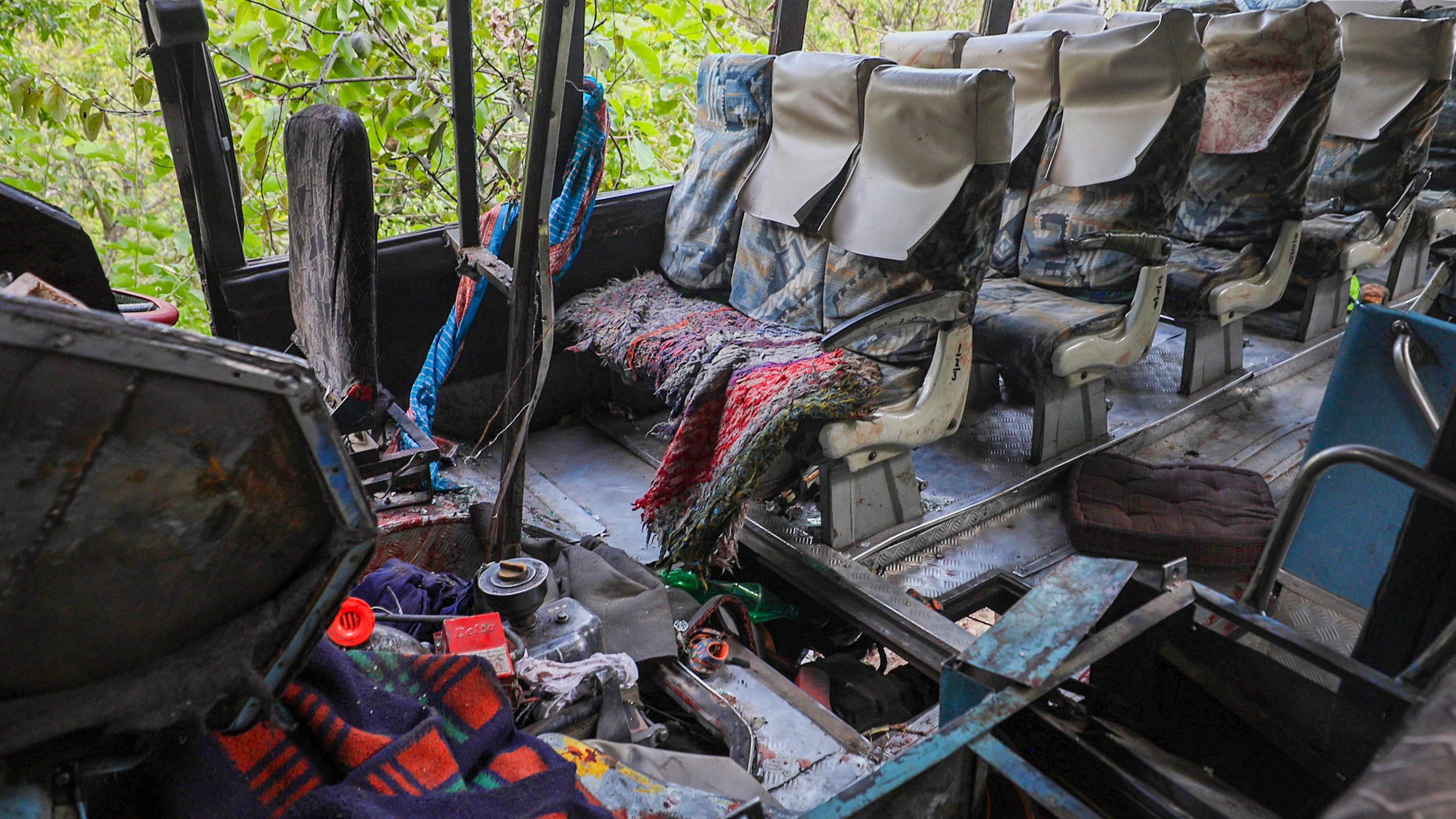
The damaged inside of the bus carrying pilgrims that was ambushed by terrorists, in Reasi district of Jammu and Kashmir, Monday, June 10, 2024.
Credit: PTI Photo
On June 9, the day Narendra Modi was sworn in as prime minister for the third time, nine Shiv Khori pilgrims were killed in a terrorist attack in Reasi district, in Jammu. The attack is disturbing in many ways, and points to many fault lines that are increasingly becoming visible in the Jammu region.
The first such attack in Jammu & Kashmir took place on August 14, 1993, where 14 persons were shot dead after being dragged out of a bus in Kishtwar.
Reasi, which is seeing a surge in terrorism, houses the Mata Vaishno Devi shrine, and was witness to the massacre of 27 people at Prankot in April 1998.
Reasi adjoins Rajouri and Poonch districts, and since 2021, 38 soldiers and 11 civilians have been killed in terrorist attacks in these two districts. Till 2005, these two districts along with Doda in the Jammu region were hotbeds for terrorist attacks; but since 2005 it was largely peaceful. A couple of factors were key to this peace, and it is important to understand the change in dynamics now.
Something changed
However, there was a perceptible change on the ground post-August 5, 2019 when Article 370 was revoked. The revocation of special status was not well received by a substantial part of the local population. Rumours that the Union government had taken this step to alter J&K’s demography accentuated the feeling of hurt.
The healthy co-operation between the locals and the State/Army on information sharing about terrorist presence started to dry up following these developments.
In July 2020, three youth from Rajouri were killed in a staged encounter in Shopian. In December 2023, eight people from the Gujjar-Bakarwal community were picked up for questioning after four army personnel had died in a terrorist attack. Of the eight, three died in army custody, and the video of army personnel torturing them went viral.
Defence Minister Rajnath Singh expressed regret for the incident, and though the State reached out to the bereaved families and assured reparations, the damage was done.
Communal lines
In its attempt to win over the Muslims in J&K, the Bharatiya Janata Party (BJP) government granted ST status to the Paharis settled mostly in Rajouri, Poonch and pockets of Kashmir. The Paharis consist of both Muslims and Hindus and are relatively better off than Gujjars, who have opposed such a move for fear of losing a share of their quota.
Repeated assurances from the government did not work, and this was evident in the results of the recently concluded general elections. The BJP-backed J&K Apni Party candidate from the Anantnag-Rajouri constituency came a distant third, while the National Conference candidate won by a margin of close to 300,000 votes.
Between 1995 and 2005, terrorists specifically targeted Hindus in this region to stoke communal tensions. Though they largely failed in it, many Hindus migrated to safer places.
In January 2023, seven Hindus were killed in Dangri, in Rajouri district. This brought back memories of October 2005 when terrorists killed 11 men in Rajouri district.
The Gujjars too have been targeted by terrorists. In February 2001, 15 members of the Bakarwal community, including women and children, were killed in the Kot Charwal area of Rajouri district because they had joined the Village Defence Committee to fight terrorists. Kot Charwal is adjacent to Prankot, in Reasi district.
Targeting Jammu
The Reasi killings bring to the fore the deepening fault lines and Pakistan’s insidious plot to put Jammu on the boil. It holds the key to communal harmony in the Union Territory. The killings show that the security apparatus has taken its eyes off Jammu and is now focusing on Kashmir where a significant drop in terrorism is showcased as the biggest achievement since Article 370 was revoked.
The frequent attacks in the Jammu region show a pattern that strategic thinkers in New Delhi must not overlook. They must redraw their strategy before this region returns to pre-2005 days of unrest.
(Tarun Upadhyay is a Jammu-based journalist. X handle: @tarun33.)
Disclaimer: The views expressed above are the author's own. They do not necessarily reflect the views of DH.